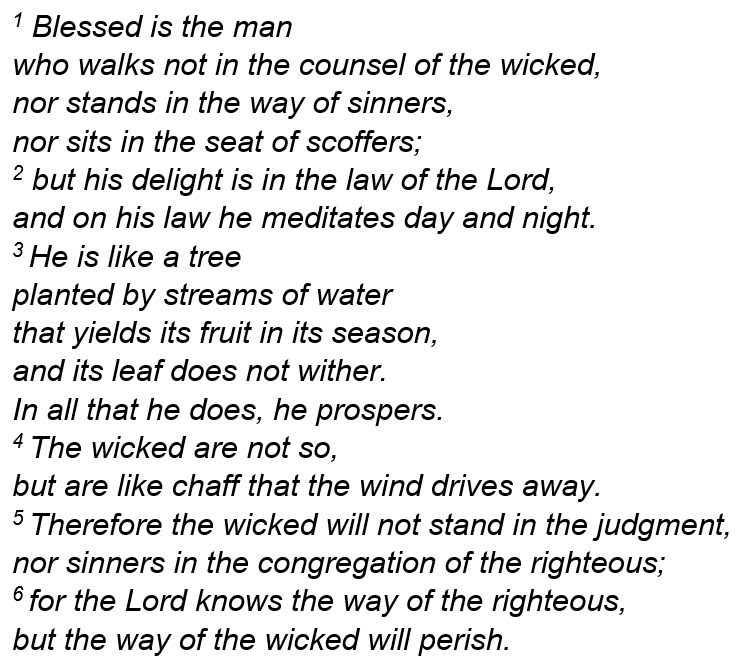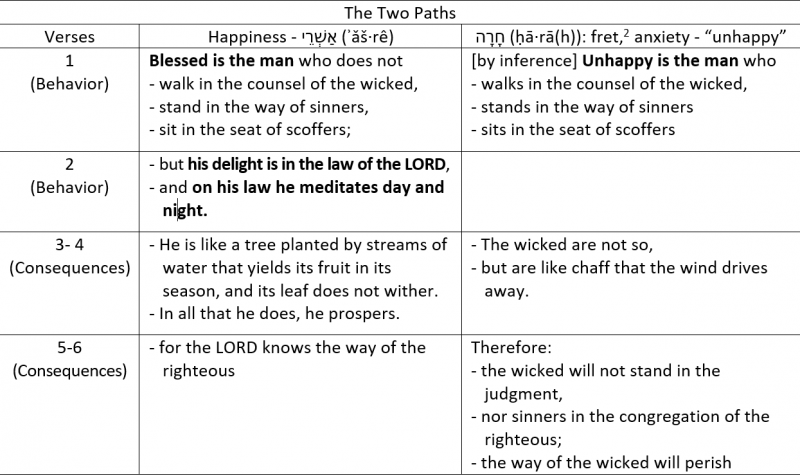The Pursuit of Happiness Photo by Lesly Juarez on Unsplash
One of classical marks of the human quest is the pursuit of happiness. But what is happiness? What is it that human beings are looking for? And how do they find it?
To understand happiness, it would be wise to go back to first principles and see what the word of God has to say. So let’s begin by looking at the two key words translated happiness.
Each testament includes two main concepts of happiness, corresponding Greek and Hebrew words. Each pair can be translated “happy” or “happiness.” But they mean different things.
– The Hebrew ʾǎš·rê and the Greek makarios mean “Happy is the man.”
– The Hebrew bā·rǎḵ and the Greek eulogeo are used for a benediction or blessing
The Hebrew word bā·rǎḵ is used to describe God’s blessing on Adam in the cultural mandate, Genesis 1:28. The NT Greek equivalent eulogeo is the basis for our English word “eulogy.”
While both of these words are translated “happy” or “happiness,” we want to focus on the first set of words, the Hebrew term ʾǎš·rê, and the Greek makarios. Both speak of the state of happiness. (While both words are translated variously in different English versions, in the material that follows I will reference the English version that renders the word [or its derivative] as “happy” or “happiness.”)
Pursuit of Happiness in the Old Testament
What does it mean to be happy? Let’s unpack the Old Testament concept of אַשְׁרֵי (ʾǎš·rê).
This is “translated variously as happiness, how happy! blessedness, blessed!, well-being. It means a heightened state of happiness and joy, implying very favorable circumstance and enjoyment.”[1]
Young’s Literal Translation captures the delight of this term in the opening line of the Psalter: “O the happiness of that one” Psalm 1:1. As does the New Living Translation in Psalm 40:4, “Oh, the joys of those who trust the LORD.” Both of these renderings capture the exuberance of the happy man.
ʾAš·rê implies prudence, the capacity to understand, and hence act wisely. The imprudent man who acts foolishly, ends his life in confusion and despair.
Three major circumstances in the OT describe the man in a state of “well-being.” Happy is the person who keeps the law, who trusts in the Lord, who is forgiven. Let’s look at each of these settings where happiness is found.
Happy is the man who keeps the law
Each of the following texts use the word אַשְׁרֵי (ʾǎš·rê) to argue that to pursue happiness is to observe God’s laws, to live in the moral universe. Most uses of this word in the OT occur in the wisdom literature. Happiness is the pursuit of the wise or prudent human being! As mentioned above, the first occurrence is found in the opening of the book of Psalms. The one pursuing happiness takes delight in the laws of the Lord.
O the happiness of that one, who hath not walked in the counsel of the wicked. And in the way of sinners hath not stood, And in the seat of scorners hath not sat; But — in the law of Jehovah is his delight, And in His law he doth meditate by day and by night. Ps 1:1-2 (YLT)
 Psalm 1:1-6 opens the book of Psalms by describing the nature of a happy man and contrasting him with the unhappy man. Two paths are open to each human being. One leads to happiness and one to misery. These two paths are described in the text of Psalm 1:1-6 (NIV):
Psalm 1:1-6 opens the book of Psalms by describing the nature of a happy man and contrasting him with the unhappy man. Two paths are open to each human being. One leads to happiness and one to misery. These two paths are described in the text of Psalm 1:1-6 (NIV):

The table below summarizes the contrast between these two journeys/destinations.
 Note that those who pursue happiness delight in the law of the LORD and meditate on it day and night. Those who do not pursue happiness are scoffers who disrespect God’s laws. The outcome of each life is different. Those who seek happiness are like fruitful trees planted by streams of living water. The slothful, on the other hand, end up like the husk of the wheat blown away in the wind.
Note that those who pursue happiness delight in the law of the LORD and meditate on it day and night. Those who do not pursue happiness are scoffers who disrespect God’s laws. The outcome of each life is different. Those who seek happiness are like fruitful trees planted by streams of living water. The slothful, on the other hand, end up like the husk of the wheat blown away in the wind.
Christ makes a similar distinction in John 8:31-32 where he differentiates between believers – those who profess faith in Christ, and disciples – those who, continuing in his word day and night, act in obedience.
– Darrow Miller
… to be continued
[1] References: logos on line and the Dictionary of N.T. Theology
[2] OT word for these Greek words חָרָה (ḥā·rā(h)): v.; fret, formally, anger, i.e., be in a state of worry and concern as an extension of being internally angry (Ps 37:1, 7, 8; Pr 24:19+)
- ἄλυπος (alypos), ον (on): adj. [see ἀλυπότερος (alypoteros), α (a), ον (on), just below]; ≡ Str 253; TDNT 4.323—free from anxiety (Php 2:28+) only place in NT
- Phils 2:28 (NIV) Therefore I am all the more eager to send him, so that when you see him again you may be glad and I may have less anxiety.
- περίλυπος (perilypos), ον (on): adj.; ≡ Str 4036; TDNT 4.323—LN 25.277 very sad, overwhelmingly sorrowful; greatly distressing (Mt 26:38; Mk 6:26; 14:34; Lk 18:23, 24+)
- Matt 26:38 (NIV) – Then he said to them, “My soul is overwhelmed with sorrow to the point of death. Stay here and keep watch with me.”
- Mark 6:26(NIV) -The king was greatly distressed, but because of his oaths and his dinner guests, he did not want to refuse her.
- Mark 14:34 (NIV) -My soul is overwhelmed with sorrow to the point of death,” he said to them. “Stay here and keep watch.”
- Luke 18:23 (NIV) – When he heard this, he became very sad, because he was very wealthy.






